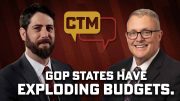Forty-one Senate Republicans sent a letter to Senate Majority Leader Harry Reid last week urging him and Senate Democrats to start addressing “taxmageddon” — the impending tax hikes that will drain $500 billion out of the economy every year starting January 1st, unless something is done:
It is essential that Congress and the president address these coming tax increases this summer, rather than creating additional uncertainty for families and job creators by waiting until the last possible minute. The time to begin is now.
[If nothing is done] this would be, without any exaggeration, the largest tax increase in American history.
House Speaker John Boehner, on ABC’s This Week, added:
We’re looking at the largest tax increase in American history on January the 1st. We’re looking at big cuts to our Department of Defense. And we’re looking at an increase in the debt limit. Why do we want to wait to rush this through at the end of the year after the election?
Speaking for the Democrats, Rep. Nancy Pelosi (D-Calif.) drew the line in the sand:
[We] Democrats will again fight to extend the tax cut for the middle class and work to ensure that the wealthiest Americans pay their fair share as we reduce out deficit.
While Republicans continue to protect millionaires and the special interests, Democrats are committed to acting quickly to ensure certainty for America’s middle class and small business.
Senator Charles Schumer (D-N.Y.) made it clear that the only agreement likely to pass the Senate will have to include tax increases:
The answer is very simple to our Republican colleagues who want to help…: revenues. The way to deal with [this] is to put revenues on the table.
As examined here the total of all the tax increases will take $5 trillion out of the productive economy over the next decade, and still would not be enough to close the deficit significantly. Those increases include:
- Applying the Alternative Minimum Tax, or AMT, for the first time to 25 million taxpayers starting in 2013
- Eliminating the deductibility of state or local taxes on federal returns
- Reinstituting the Marriage Penalty tax
- Cutting the child tax credit by half
- Reinstituting the “death tax” – estate taxes would kick in at 55 per cent on anything above $1 million
- Increasing the capital gains tax by 33 percent
- The kicking in of half-a-dozen taxes buried in Obamacare, and
- Ending the payroll tax “holiday” bringing them back up to 6.2% from the current rate of 4.2%.
In addition there are other negatives: the uncertainty about what Congress will actually do if it waits until the last minute, resulting in the reluctance of business owners to take on new hires, to say nothing of the impact on the economy. Economist Mark Zandi has estimated that the dramatic increase in taxes would slow the economy by at least three percent a year, possibly pushing it back into recession.
What is clear from all of this political maneuvering is that nothing is likely to happen before the last minute and then, as usual, Congress will kick the can into next year. Clint Stretch, the managing principal at Deloitte Tax LLP, said: “If I had to bet, toward the end of the year [Congress will] extend everything for one year because that’s the path of least resistance.”
Rep. Paul Ryan (R-Wisc.) agrees with Stretch’s assessment of the political reality of passing the buck, saying that he’s “totally up” for negotiating a temporary extension of current tax policies in order to avoid the pending end-of-the-year train wreck.
Observers of the current scene then can watch with interest as maneuvering over taxmageddon increases in both volume and rancor. But the outcome is all but certain: nothing is likely to happen before the election, and the lame duck Congress will then drop-kick the issue into next year by extending current law and letting the new Congress deal with it. It’s how the system works.




